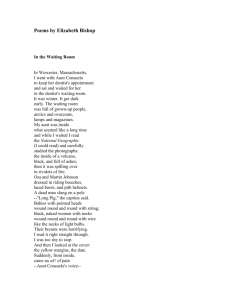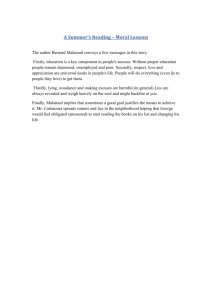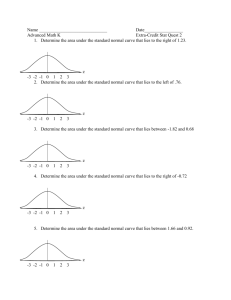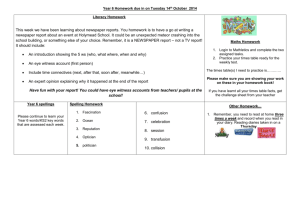Bishop, `Behind Stowe`, `The Man Moth`, `Visit to St. Elizabeth`s`
advertisement
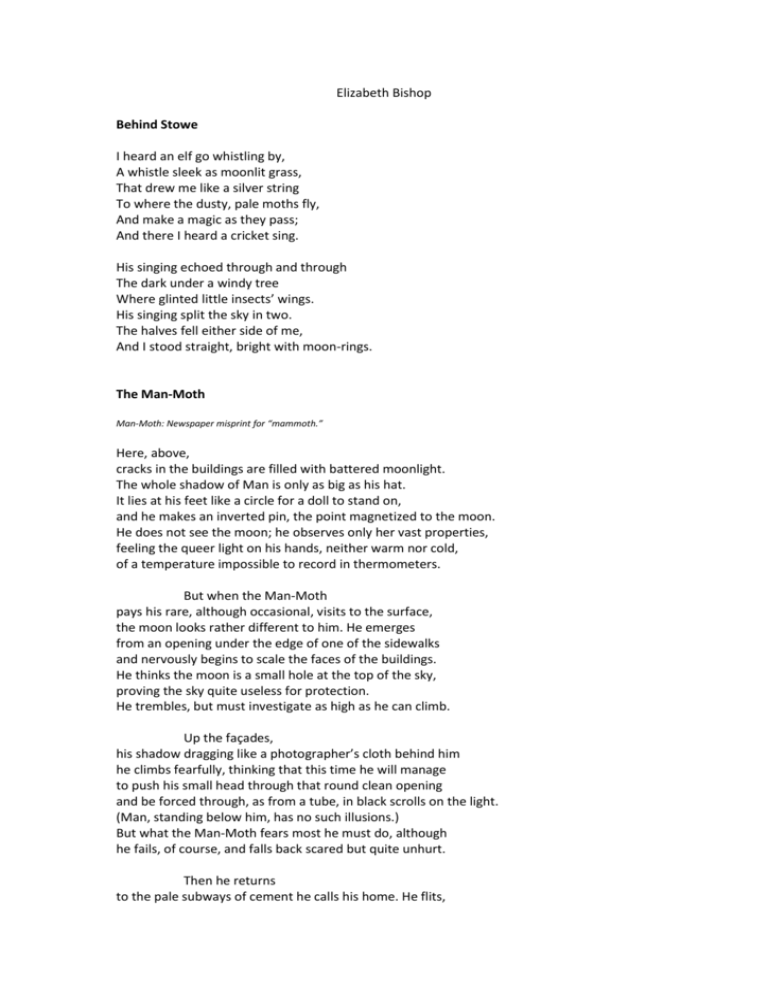
Elizabeth Bishop Behind Stowe I heard an elf go whistling by, A whistle sleek as moonlit grass, That drew me like a silver string To where the dusty, pale moths fly, And make a magic as they pass; And there I heard a cricket sing. His singing echoed through and through The dark under a windy tree Where glinted little insects’ wings. His singing split the sky in two. The halves fell either side of me, And I stood straight, bright with moon-rings. The Man-Moth Man-Moth: Newspaper misprint for “mammoth.” Here, above, cracks in the buildings are filled with battered moonlight. The whole shadow of Man is only as big as his hat. It lies at his feet like a circle for a doll to stand on, and he makes an inverted pin, the point magnetized to the moon. He does not see the moon; he observes only her vast properties, feeling the queer light on his hands, neither warm nor cold, of a temperature impossible to record in thermometers. But when the Man-Moth pays his rare, although occasional, visits to the surface, the moon looks rather different to him. He emerges from an opening under the edge of one of the sidewalks and nervously begins to scale the faces of the buildings. He thinks the moon is a small hole at the top of the sky, proving the sky quite useless for protection. He trembles, but must investigate as high as he can climb. Up the façades, his shadow dragging like a photographer’s cloth behind him he climbs fearfully, thinking that this time he will manage to push his small head through that round clean opening and be forced through, as from a tube, in black scrolls on the light. (Man, standing below him, has no such illusions.) But what the Man-Moth fears most he must do, although he fails, of course, and falls back scared but quite unhurt. Then he returns to the pale subways of cement he calls his home. He flits, he flutters, and cannot get aboard the silent trains fast enough to suit him. The doors close swiftly. The Man-Moth always seats himself facing the wrong way and the train starts at once at its full, terrible speed, without a shift in gears or a gradation of any sort. He cannot tell the rate at which he travels backwards. Each night he must be carried through artificial tunnels and dream recurrent dreams. Just as the ties recur beneath his train, these underlie his rushing brain. He does not dare look out the window, for the third rail, the unbroken draught of poison, runs there beside him. He regards it as a disease he has inherited the susceptibility to. He has to keep his hands in his pockets, as others must wear mufflers. If you catch him, hold up a flashlight to his eye. It’s all dark pupil, an entire night itself, whose haired horizon tightens as he stares back, and closes up the eye. Then from the lids one tear, his only possession, like the bee’s sting, slips. Slyly he palms it, and if you’re not paying attention he’ll swallow it. However, if you watch, he’ll hand it over, cool as from underground springs and pure enough to drink. Visits to St. Elizabeths This is the house of Bedlam. This is the man that lies in the house of Bedlam. This is the time of the tragic man that lies in the house of Bedlam. This is a wristwatch telling the time of the talkative man that lies in the house of Bedlam. This is a sailor wearing the watch that tells the time of the honored man that lies in the house of Bedlam. This is the roadstead all of board reached by the sailor wearing the watch that tells the time of the old, brave man that lies in the house of Bedlam. These are the years and the walls of the ward, the winds and clouds of the sea of board sailed by the sailor wearing the watch that tells the time of the cranky man that lies in the house of Bedlam. This is a Jew in a newspaper hat that dances weeping down the ward over the creaking sea of board beyond the sailor winding his watch that tells the time of the cruel man that lies in the house of Bedlam. This is a world of books gone flat. This is a Jew in a newspaper hat that dances weeping down the ward over the creaking sea of board of the batty sailor that winds his watch that tells the time of the busy man that lies in the house of Bedlam. This is a boy that pats the floor to see if the world is there, is flat, for the widowed Jew in the newspaper hat that dances weeping down the ward waltzing the length of a weaving board by the silent sailor that hears his watch that ticks the time of the tedious man that lies in the house of Bedlam. These are the years and the walls and the door that shut on a boy that pats the floor to feel if the world is there and flat. This is a Jew in a newspaper hat that dances joyfully down the ward into the parting seas of board past the staring sailor that shakes his watch that tells the time of the poet, the man that lies in the house of Bedlam. This is the soldier home from the war. These are the years and the walls and the door that shut on a boy that pats the floor to see if the world is round or flat. This is a Jew in a newspaper hat that dances carefully down the ward, walking the plank of a coffin board with the crazy sailor that shows his watch that tells the time of the wretched man that lies in the house of Bedlam.
